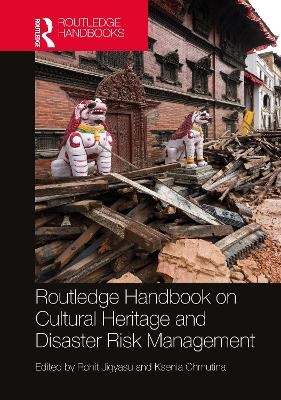
Routledge Handbook on Cultural Heritage and Disaster Risk Management
Routledge (Verlag)
978-1-032-27480-5 (ISBN)
With 22 contributions from leading scholars and practitioners in the field, chapters explore the various contexts for cultural heritage and disaster risk management, illustrated through case studies from around the world. The Handbook is organised into 4 parts: Part 1 includes Disaster Risk Management and Cultural Heritage, Part 2 helps to Understanding the context, Part 3 focuses on the challenges and Part 4 delves deep into the future prospects. This Handbook provides insights a wide range of topics and themes, such as climate change, conflict, urbanisation, the role of community, and examines the relationships with a range of sectors such as governance and policy, finance, infrastructure, shelter, and urban planning. It also presents critiques on issues that are often taken for granted, including technocratic approaches, nature/culture binary, the romanticisation of traditional knowledges and the role of recovery and reconstruction. Insights into the future are also presented, and the Handbook concludes with a detailed agenda of proposed action to be taken in the field.
Offering critical reflections on the topic, this book caters to students, researchers, professionals, and policy makers in the fields of disaster studies, cultural studies, heritage studies, conservation and geography.
Rohit Jigyasu is a conservation architect and risk management professional from India, currently working at ICCROM as Project Manager on Urban Heritage, Climate Change and Disaster Risk Management. Rohit served as UNESCO Chair holder professor at the Institute for Disaster Mitigation of Urban Cultural Heritage at Ritsumeikan University, Kyoto, Japan, where he was instrumental in developing and teaching International Training Course on Disaster Risk Management of Cultural Heritage. He was the elected President of ICOMOS-India from 2014-2018 and president of ICOMOS International Scientific Committee on Risk Preparedness (ICORP) from 2010-2019. Rohit served as the Elected Member of the Executive Committee of ICOMOS since 2011 and was its Vice President from 2017-2020. Before joining ICCROM, Rohit has been working with several national and international organizations such as UNESCO, UNISDR, Getty Conservation Institute and World Bank for consultancy, research and training on Disaster Risk Management of Cultural Heritage. Ksenia Chmutina is a Professor of Disaster Studies at the School of Architecture, Building and Civil Engineering at Loughborough University. Her research focuses on the processes of urban disaster risk creation and systemic implications of sustainability and resilience in the context of neoliberalism. Her research interests also include narratives and framings of disasters, intersectionality and vulnerability, and interlinkages between critical urban studies, cultural heritage, and disaster studies. A core part of her activities is science communication: she is a co-host of a popular podcast ‘Disasters: Deconstructed’. Ksenia uses her work to draw attention to the fact that disasters are not natural.
Preface: JC Gaillard
Introduction: Why Disaster Risk Management of Cultural Heritage?
Ksenia Chmutina and Rohit Jigyasu
Section 1 Disaster Risk Management and Cultural Heritage
Chapter 1: Disaster Risk Management Terms and Concepts
Lee Bosher
Chapter 2: Role of Intangible Attributes of Heritage in Disaster Risk Reduction
Sukrit Sen
Chapter 3: A new approach to cultural heritage and disaster risk reduction: a review of international policies
Giovanni Boccardi
Chapter 4: Financing Disaster Risk Management for Cultural Heritage
Barbara Minguez Garcia
Section 2: Understanding the context
Chapter 5: Heritage and Peacebuilding
Elke Selter
Chapter 6: Cultural Heritage, Climate Change and Disaster Risk Management
Will Megary
Chapter 7: Cultural heritage and urbanisation
Ebru Gencer
Chapter 8: Vernacular Built Heritage and Disaster Resilience
Rajendra Desai
Chapter 9: Risk Management
Sukhreet Bajwa, Tanaya Sarmah, Ranit Chatterjee and Rajib Shaw
Section 3: Understanding the challenges
Chapter 10: All Fired Up: The Inseparability of Nature and Culture in Disaster Risk Management
Steve Brown
Chapter 11: The Dangers of Romanticising Local Knowledge in the Context of Disaster Studies and Practice
Demet Intepe, Robert Sakic Trogrlic, Maria Evangelina Filippi, Thirze Hermans, Hannah Bailon and Anuzska Maton
Chapter 12: Challenges with techno-centric approaches in the implementation of Disaster Risk Management for Cultural Heritage
David Torres and Giuseppe Forino
Chapter 13: Development and cultural heritage in the disaster capitalism era
Victor Marchezini, Andrea Lampis, Danilo Celso Pereira and Adriano Mota Ferreira
Chapter 14: Cultural Heritage and Post-Disaster Recovery
Wesley Cheek
Chapter 15: Reconstruction as recovery:The politics behind why heritage is funded internationally, nationally, and locally
Vanicka Arora
Chapter 16: ‘Dark heritage’: landscape, hazard, and heritage
Jazmin Scarlett, Miriam Rothenberg, Felix Riede and Karen Holmberg
Section 4: Moving forward
Chapter 17: Arts and other Cultural Expressions as Tools for Disaster Risk Management
Claudia González-Muzzio, Claudia Cardenas and Bernadette Esquivel
Chapter 18: Planning for Disasters facing Heritage at Risk: Ethics and Epistemes
Fallon S. Aidoo
Chapter 19: New Technologies and Disaster Risk Management for Cultural Properties
Hirofumi Ikawa
Chapter 20: Integrating DRM considerations into heritage management systems: barriers and opportunities
Luisa De Marco
Chapter 21: Building Synergies for Cultural Heritage: insights from theory and practice
Monia del Pinto and Clinton Dean Jackson
Conclusions: Challenges and Opportunties (this will include an appendix on how to make a DRM Plan for a heritage site)
Rohit Jigyasu and Ksenia Chmutina
| Erscheinungsdatum | 28.12.2023 |
|---|---|
| Zusatzinfo | 8 Tables, black and white; 16 Line drawings, black and white; 38 Halftones, black and white; 54 Illustrations, black and white |
| Verlagsort | London |
| Sprache | englisch |
| Maße | 174 x 246 mm |
| Gewicht | 780 g |
| Themenwelt | Kunst / Musik / Theater |
| Reisen ► Reiseführer | |
| Geisteswissenschaften ► Geschichte ► Hilfswissenschaften | |
| Sozialwissenschaften | |
| Technik ► Bauwesen | |
| ISBN-10 | 1-032-27480-8 / 1032274808 |
| ISBN-13 | 978-1-032-27480-5 / 9781032274805 |
| Zustand | Neuware |
| Informationen gemäß Produktsicherheitsverordnung (GPSR) | |
| Haben Sie eine Frage zum Produkt? |
aus dem Bereich


